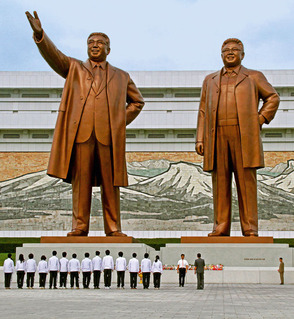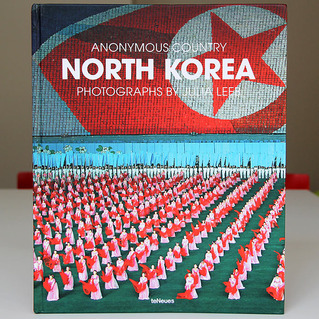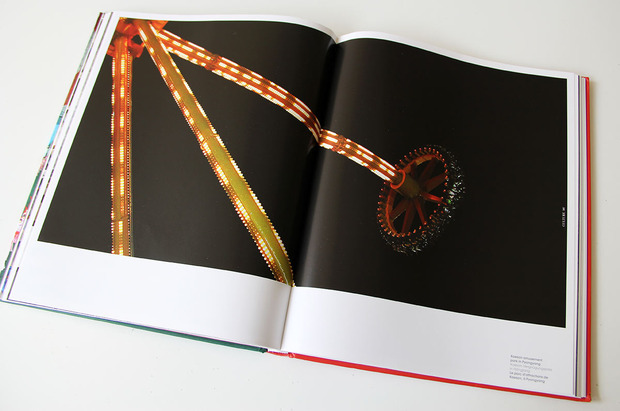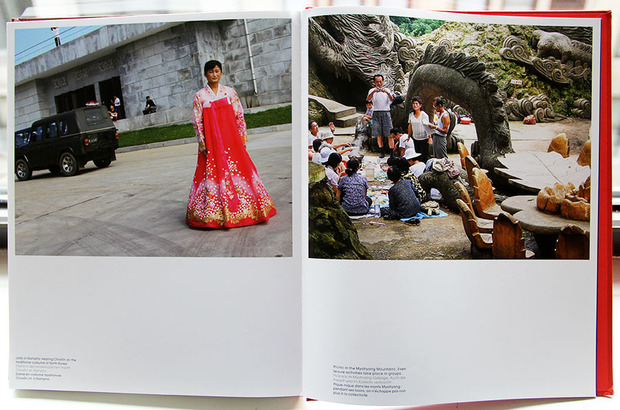North Korea: Anonymous Country
Disguised as a tourist, photojournalist Julia Leeb offers a glimpse of the isolated society in a new hardcover book


North Korea may be a familiar figure in international news headlines, but even in the age of the internet, the little we know stems mostly from rumors, accounts from defectors who risked their lives to escape and bizarre YouTube videos. Though Korea was a whole body with a shared history for more than a thousand years, since dividing in 1945, North Korea has greatly diverged into a completely separate society, and transformed into one of the most isolated and perhaps exceptional places in the world.
In the new hardcover “North Korea: Anonymous Country,” German photojournalist Julia Leeb gives the world a rare glimpse of the tightly controlled “hermit kingdom” through her camera lens, while visiting the country under the guise of a tourist trip.


Born in a small village in Germany, Leeb tells CH, “I couldn’t wait to grow up so I could travel.” And true to her word, Leeb has visited around 80 different countries and lived in all over the world: she spent six months in South America, studied international relations in Spain for three years, worked for the foreign ministry in Italy and moved to Egypt for a year to do peace studies. Her curiosity is the driving force behind her photojournalism. “I’ve always wanted to go to North Korea—because you don’t know anything about [it]. You have the profile of Kim Jong-Un and the military, but what about the 24 million people who live there?” she asks.

Once Leeb learned that it was easier to visit North Korea than expected (albeit as tourist and not a reporter) she visited the country twice, in 2012 and 2013. Most of the photographs in the book are from her more recent trip, except for the photos of North Korea’s annual Arirang Festival, which are from 2012. Leeb notes that there was a “huge difference” between her two trips: “The moment we arrived in 2013 was very sensitive,” she remembers. “The peace treaty agreement [with South Korea] had just dissolved and we really didn’t know if there would be war or not because we didn’t have any chance to communicate with the outside world. We didn’t have internet, we were not able to make phone calls, we couldn’t read newspapers; we were totally isolated. Once we had television and we saw that America had brought two bombers to South Korea. We just didn’t know what was going on.”
“The first time [I visited], they never talked about war,” Leeb recalls. “The second time, war was not so abstract anymore—it was not an abstract term, but something concrete.”

Against this constant pressure of never knowing, Leeb snapped photographs whenever she could, under the supervision of the infamous North Korean guides. These handlers make sure tourists adhere to strict rules such as never taking photos of poverty, or that statues or portraits of the Great Leaders must never be cropped, but appear entirely in the photo. “But full control is not possible,” she remembers. “Sometimes, they fall asleep. Or, you just take pictures out of the bus.”

Leeb divides the selection of 160 colored photographs into three general sections: architecture, culture and people. The culture section covers the Arirang Festival—the DPRK’s annual extravaganza (think Olympics Opening Ceremonies on steroids) of the country’s culture and history, though this year’s has been canceled due to unknown reasons—which is surely the highlight of the book. “It’s the most crazy thing you’ve ever seen in your life,” says Leeb. “It’s just incredible—over 100,000 people participate and I don’t know how they organize it because people come without cars, without buses—just walking. You see something and you don’t know if you’re dreaming or awake. It’s incredible to describe.” As Leeb zooms in on hundreds of thousands of people, each carrying a card, each performing their choreographed move, losing their self to become part of something bigger—the situation begets a question: who are all of these people performing for?

Many of the photos of everyday life show how empty the drab streets are. But others show a side of North Korea that’s less prominent in the news: an amusement park, the subway station with escalators and traditional snake wine (and excellent beer). No matter the subject, the photos eerily give off a sense of time travel—though they were taken in 2012-13, they easily could have been a snapshot of decades past.
“I was surprised that the North Koreans and I have more in common than I thought,” says Leeb. “Even though they are totally isolated—they don’t know anything from the outside word—for example, we still have the same humor. We can still laugh about the same stuff. People are very eager for knowledge and are very curious.”

As a teNeues Interactive Book, the hardcover offers some opportunities to connect to the app, which reveals video footage that Leeb shot, along with music specially composed by Xenia Maculan, who was also on the trip. Their purpose was to make the book’s content more vivid; Leeb refers to the common misperception of North Koreans as mindless “robots” but wanted to show that they are people who are very much alive.
“I have a vision. Politicians say, ‘Stop and have a dialogue.’ My goal is to start a dialogue on the ground, and the first step is to show the people outside, the faces of North Korea. I don’t want to talk about politics, I don’t want to talk about the dictator. I want to talk about these people and give them a face. And one day, I hope they will see our face.”

With forewords by anonymous street artist JR (who made a similar visit to the DPRK) and Niko Karasek, and with texts in English, German and French, “North Korea: Anonymous Country” can be pre-ordered from teNeues for $95, which releases on 15 August 2014. The title will also be available from Amazon on 15 September 2014.
Images of the book by Cool Hunting, photo images ©Julia Leeb courtesy of teNeues











